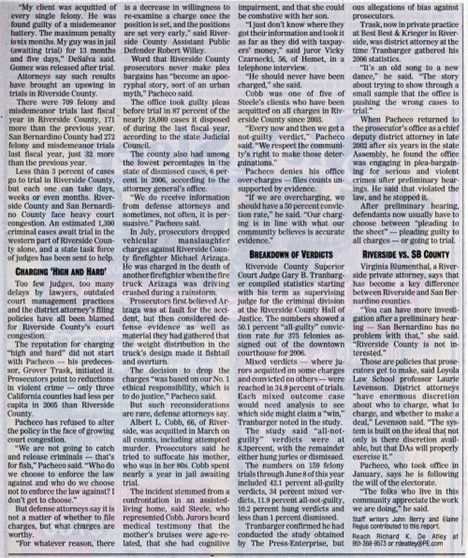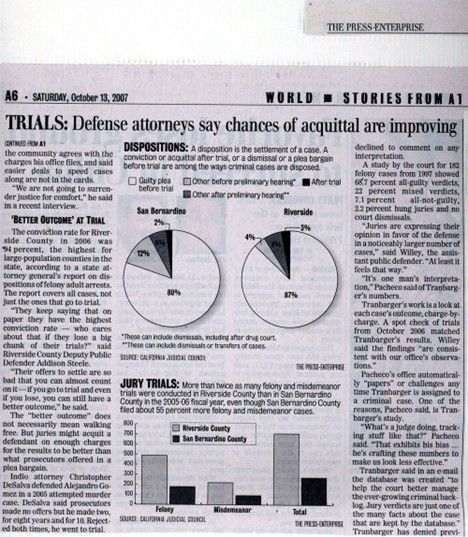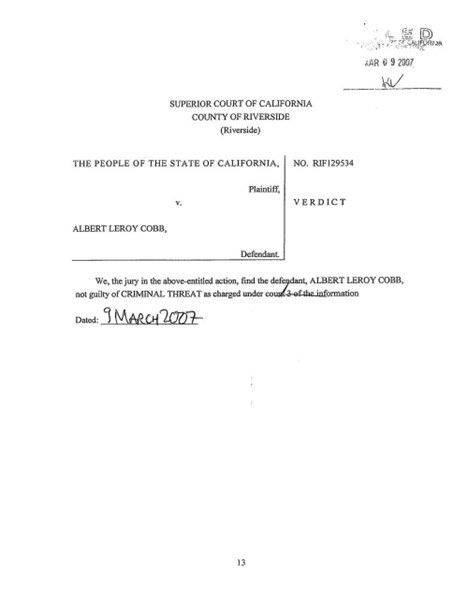Representing Terroristic Threats Cases in Santa Barbara County, California
Addison Steele has:
Three terrorist threats acquittals
(Penal Code § 422)
(Albert Cobb, Enrique Angulo
and Harvey Parker).
Three terrorist threats counts not filed after preliminary hearing
(Penal Code § 422)
(Joseph Cordero).
A terrorist threats conviction can result in up to three years in prison. The problem is that the case law makes just about anything a person says a terrorist threat.
I have done five terrorist threats trials. I won three of the four felony terrorist threats counts I've faced in the trial.
My terrorist threats trial successes include:
Albert Cobb
- Charges: Attempted murder (Penal Code § 187(a)), elder abuse (Penal Code § 368(b)(1)) and terrorist threats (Penal Code § 422).
- Exposure: Al was facing eighteen years to life in prison.
- Outcome: Found not guilty of all charges.
- Al was featured in a large exposé article on how many trials the district attorney was losing.
- Trials become an attractive option, Richard K. De Atley, The Press-Enterprise, front page A1, October 13, 2007.
"Albert L. Cobb, 66, of Riverside, was acquitted in March on all counts, including attempted murder. Prosecutors said he tried to suffocate his mother, who was in her 80s.
. . .
The incident stemmed from a confrontation in an assisted living home, said Steele, who represented Cobb. Jurors heard medical testimony that the mother's bruises were age-related, that she had cognitive impairment and that she could be combative with her own son.
. . .
Cobb was one of five of Steele's clients who have been acquitted on all charges in Riverside County since 2003."
This is the exposé article in which Al's case was featured.
This is the Verdict Form where Al was found NOT GUILTY of criminal threats.
Enrique Angulo
- Charges: Attempted murder (Penal Code § 664/187(a)) with personal use of a firearm (Penal Code § 12022.53(c)), assault with a firearm (Penal Code § 245(a)(2)) and terrorist threats (Penal Code § 422).
- Exposure: Enrique was facing thirty-eight years to life in prison.
- Outcome: Enrique was acquitted of attempted murder and
terrorist threats. He was convicted of assault with personal use of a firearm. The acquittal on the attempted murder charge saved Enrique from a life sentence. He was sentenced to seven years in prison.
The verdict forms where the jury found Enrique NOT GUILTY of attempted murder and NOT GUILTY of terrorist threats.
Harvey Parker
- Charges: Terrorist threats (Penal Code § 422) and assault (Penal Code § 243(d)).
- Exposure: Harvey was facing three years and eight months in prison.
- Outcome: Harvey was acquitted in the middle of trial by the court of the terrorist threats charge; the court then dismissed the assault charge, and Harvey went home a free man.
This is the Minute Order, where Harvey and I beat all of Harvey's charges during the trial.
Joseph Cordero
- Charges: Three counts of terrorist threats (Penal Code § 422), all of which had a gang special allegation (Penal Code § 186.22(b)).
- Exposure: Joseph was facing ten years and four months in prison.
- Outcome: After the preliminary hearing, the district attorney did not file any of the charges.
Questions You Should Ask an Attorney That You are Considering Hiring for a Terrorist Threats Case:
- Have you done a terrorist threats trial before?
- This question is important because a terrorist threat trial involves complex legal concepts and knowledge of the subject's case law.
- I have done five terrorist threat trials.
- What were the results of your terrorist threats trials?
- This question is important because, in a terrorist threats trial, there are so many ways to fight hard and attack the district attorney's case. If an attorney has won terrorist threat trials, the attorney has the experience and skills to handle the level of complexity involved in a terrorist threat trial.
- I have won the terrorist threats charges in three of the four felony trials I've done that included terrorist threats charges. If you find another attorney who has done the number of terrorist threat trials that I have done and has had more successful outcomes than I have had, hire that person. If you want the best possible chance of winning, you should contact me.
- Do you train other lawyers in your techniques for winning terrorist threat trials?
- This question is important because, typically, only the leading lawyers in a field are invited to conduct training for other lawyers.
- I was a speaker at the California Public Defenders Association (CPDA) homicide defense training in 2011 to train on my winning trials by humanizing the client method. I have also given that same training at the Riverside County Public Defenders Office, the Riverside County Barristers, the Santa Clara County Public Defenders Office, the Santa Barbara County Public Defenders Office, and the San Francisco County Public Defenders Office. I was a speaker at the CPDA homicide defense training in 2012 to train on utilizing a neuropsychologist in a homicide case. The skills that I teach to other lawyers are easily utilized in a terrorist threats trial.
- How long were the terrorist threats trials you've done, and how many days of defense did you present?
- These questions are important because although some cases just call for a short trial, a short trial can also mean that the prosecution was not sufficiently challenged or that no defense was presented. A terrorist threats trial that lasts five or so court days is reason for concern because it's an indicator that the prosecution is not being thoroughly challenged and a complete defense is not being presented.
- I have spent forty-two court days in terrorist threats trials. I have asuccess rate in terrorist threats trials that is really unparalleled.
CONTACT INFORMATION
Phone: (805) 995-9368
Email: addison@steelelawfirmsb.com
Address: 1226 1/2 State St., Suite 2, Santa Barbara, CA 93101





